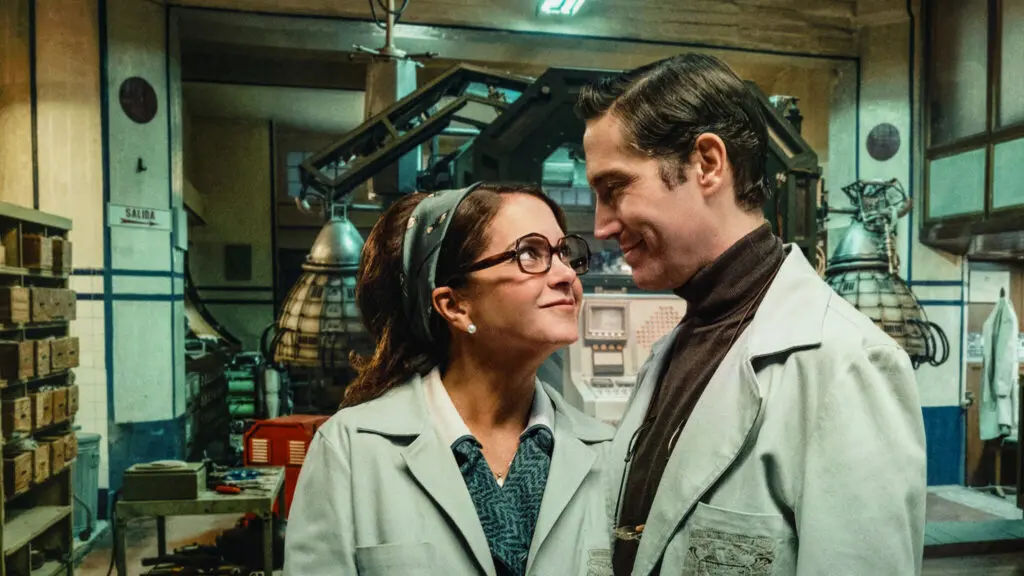
Blimey, this is going to annoy people, isn’t it? The underlying thesis of Our Times, a Netflix rom-com about two married physicists who accidentally travel from 1966 to 2025, is essentially that female empowerment means your husband becomes surplus to requirements. In fact, in a brilliantly confused ending, it argues that true love just might be living entirely separate lives. The movie’s too relaxed and dopey to be offensive, but that doesn’t mean it’s any good, either.
And it’s a shame since the plot hook is a good one. Nora (Lucero) and Hector (Benny Ibarra) are revolutionary scientists in the swinging sixties, but their work on a time machine takes a turn when a planned voyage to 15 minutes into the future accidentally shunts them forward 59 years. Stuck in 2025, they do an intermittently funny fish-out-of-water routine while they attempt to get used to advanced technology (the internet! Touch screens!) and contemporary attitudes (sex before marriage! For fun!) while working on a way home. And then… feminism.
Feminism isn’t the bad guy in Our Times, but it makes a bad guy of Hector. As a staunch traditionalist, he yearns for the simplistic old-fashioned gender norms that kept Nora in the kitchen cooking for their project’s benefactor and allowed Hector himself to soak up all the credit. In 2025, Nora is no longer invisible house help. She has her own agency, her efforts and achievements are recognised, and there’s even an International Women’s Day, a concept that Hector can’t quite fathom since there isn’t a comparative date for men (he doesn’t realize, even when he’s told, that every day that isn’t International Women’s Day is, by definition, International Men’s Day.)

The point of this is supposed to be that Hector genuinely loves Nora and simply cannot adapt to the shifting norms. In the sixties, he was the “ideal man”, arguably quite progressive, and it’s these qualities — that were so valued then — which caused Nora to fall in love with him in the first place. We don’t spend much time with the couple in the past, but it’s clear they’re happy. Nora’s arc isn’t realizing she never loved Hector, but coming to terms with the idea that the world they existed in was stifling her potential. Hector’s arc is supposed to be realizing that his inability to let go of the ingrained habits and expectations of that time are damaging to the woman he loves, but the script from writers Juan Carlos Garzón and Angélica Gudiño isn’t very good, so he mostly just turns into a demented men’s rights activist psycho overnight.
The inability of Our Times to grapple with its themes is most obvious in a silly ending that I won’t spoil here but will elsewhere. But there’s a lot that happens during the rest of the runtime – a lean 90 minutes, blessedly – that is similarly confounding, and the stuff that does make sense is largely quite dull. The leads have some romantic chemistry, but there’s no real zing in the bitterness that develops between them, and because the ostensible science-fiction components are incredibly thin, the main way the script reiterates that these are smart scientist types is by having them do awfully saccharine nonsense like say “I love you” with help from the periodic table.
I’m forced to consider what’s worse – making a rote genre movie with nothing going on underneath the hood that is nonetheless serviceable, or trying to do something genuinely interesting and ending up with a confusing mess of a final product. Our Times is obviously the latter, but I’m not entirely convinced its thematic underpinnings were all that well-intentioned. The gender dynamics are clunky and amount to an extremely surface-level interpretation of contemporary feminism that doesn’t have a clear idea of how it relates to evolving relationships. It has the distinct whiff of something trying to be provocative and court a like-minded audience by playing down to the least complex and most objectionable conclusion.


